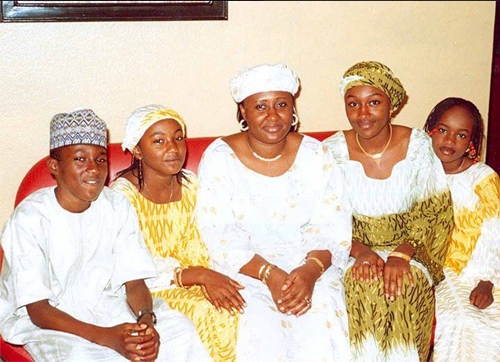Former Nigeria's first lady, Hajiya Buhari battled with cancer for eight years as the illness eventually claim her life, but the story of President Buhari's first wife lives on.
Who Was Hajiya Safinatu Buhari?
Mr. Mani, a relation of the former first lady said, "She was very shy and described her as a retiring woman."
According to the information provided on her foundation website and endorsed by Mr. Mani, late Hajiya Safinatu, a Fulani by ethnicity, was born on the 11th of December, 1952 in Jos, Plateau State into a family of 13 children, to Alhaji Yusufu Mani and Hajia Hadizatu Mani. Her mother, Hajia Hadizatu, gave birth to seven out of the 13 children. She is a native of Mani Local Government in Katsina State.
She was well-educated and was so literate that she could read and write in Arabic, being well-grounded in Islamic education. She attended the Women Teacher’s Training College in Katsina where she obtained her Grade II Teachers Certificate in 1971.
Safinatu was 14 years old in 1966 when she met her husband for the very first time. Buhari, then a young major in the Nigerian Army, had paid a visit to the house of Safinatu’s father in the company of his friend, the late Major-General Shehu Musa Yar’adua. They had both gone to see Safinatu’s father, Alhaji Yusufu Mani, who was working in Lagos then as the Private Secretary to Alhaji Musa Yar’adua, the Minister of Lagos Affairs in the Federal Cabinet of the First Republic. Shehu Musa Yar’adua and Umaru Musa Yar’adua (later President of Nigeria) were sons of Alhaji Musa Yar’adua.

What happened during the first visit to Alhaji Mani’s house must have been spectacular because immediately the young major Buhari set his eyes on Safinatu, he was struck by the arrows of Cupid. That was not going to be the last visit to the house of Safinatu’s house. Buhari would later pay numerous subsequent onibaranbolebo visits to the family and like play like play, the two started exchanging letters. With time, both fell in love and they could court for four years and the two love birds would eventually decide to take their relationship to the next level.
Interesting thing about Buhari’s relationship with Safinatu was that shortly after the two met, the Nigerian Civil War started in 1967 and Buhari was deployed to the battlefields. This was one of the most tense periods in the life of Safinatu and she would later reveal that she was always worried during the war about the welfare of her lover and would ceaselessly pray for him. In 1971, with the war over, the two lovebirds decided to seal it and they got married.
Becoming Nigeria's First Lady
According to a profile of the former first lady which was made available to a reporter, late Hajia Safinatu Buhari moved into the State House, Ribadu Road, Marina, Lagos State on the 19th of January, 1984, her husband had just become the country’s seventh head of state and as the wife of the Commander-in-Chief of the Nigerian Armed Forces.

A publication said, "That was her very first time of entering the State House even if she had been on the grounds of the State House at Dodan Barracks before. She arrived the State House with a few of her friends, relatives and her children; they were all received by her husband. But upon reaching the State House, she was disappointed with what she saw. She was expecting to see a presidential palace in all its majesty and glory, and the State House then did not have all the splendour of a Buckingham Palace. Upon arrival at the State House, she was met by the housekeeper, Mrs. Adela Giwa, who then introduced her to members of the State House domestic staff."
Family And Children
According to the late Safinatu’s profile, she had given birth to four children: Zulaihatu (now late), Magajiya-Fatima, Hadizatu-Nana and Safinatu Lami. They would also later have a fifth child, Musa (now late) as at the time her husband was overthrown.

Her Words, Legacy And Remembrance
According to a report, the wife of the Head of State, late Safinatu was quoted to have said what is important for the First Lady is to always remain patient with people and the husband as things were bound to change once they move into the position of power.
Her words: ‘…be patient and have understanding with people around you and most importantly with your husband. With the immense responsibilities of State, things are bound to be different from the time when he was not Head of State. Understanding and patience make for better co-existence and for the peace of mind the husband needs to perform effectively.’
She also expressed herself on other matters saying: ‘I think that the wives of Heads of State should be given the opportunity to speak on matters of national significance. They should willingly shoulder these responsibilities and serve as mothers of the nation. They should also aim towards achieving their set objectives so as to attain a feeling of self-fulfillment after they might have left the State House.’

She also strongly believed that the roles of First Ladies should be properly outlined, their official responsibilities identified and the necessary resources provided for them to achieve these goals and contribute their quota to national development.
She also believed that First Ladies should not be made irrelevant or dependent after their spouses must have left office. A quiet but strong-willed woman, the memory of the late Hajia Safinatu Buhari lives on in the hearts of her loved ones.

